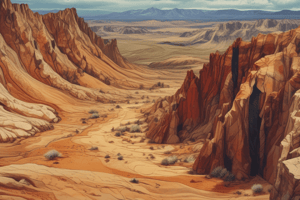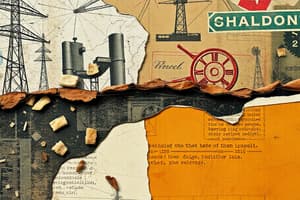Podcast
Questions and Answers
What is the difference between weathering and erosion?
What is the difference between weathering and erosion?
Weathering is the physical or chemical breakdown of rock. Erosion is the removal of weathered pieces of rock to another place.
What is the difference between mechanical and chemical weathering?
What is the difference between mechanical and chemical weathering?
Mechanical weathering is the physical breakdown of rock into smaller pieces. Chemical weathering is the breakdown of rock by chemical processes.
How do water and ice cause mechanical weathering?
How do water and ice cause mechanical weathering?
Water causes mechanical weathering when rivers or ocean waves cause rocks to collide and scrape against each other. Ice causes mechanical weathering when glaciers scrape rocks and when water freezes in cracks, expanding and widening them.
How does the movement of air cause mechanical weathering?
How does the movement of air cause mechanical weathering?
How are rocks and landforms changed by mechanical weathering?
How are rocks and landforms changed by mechanical weathering?
What is weathering?
What is weathering?
What is mechanical weathering?
What is mechanical weathering?
What is chemical weathering?
What is chemical weathering?
What is erosion?
What is erosion?
What is sediment?
What is sediment?
Study Notes
Weathering vs. Erosion
- Weathering involves the physical or chemical breakdown of rocks, while erosion refers to the removal and transportation of weathered rock particles to new locations.
Types of Weathering
- Mechanical weathering results in the physical fragmentation of rocks into smaller pieces without changing their chemical composition.
- Chemical weathering entails the alteration of rocks through chemical reactions, changing the minerals involved.
Role of Water and Ice in Mechanical Weathering
- Rivers and ocean waves can cause rocks to collide, leading to abrasion as they scrape against each other.
- Glaciers cause mechanical weathering through the scraping effect on rocks.
- Freezing water infiltrates rock crevices; as it freezes, it expands, widening cracks and enhancing mechanical weathering.
Impact of Air Movement
- Wind can carry sand particles that, upon striking rocks, cause wear through abrasion, contributing to the mechanical weathering process.
Effects on Rocks and Landforms
- Mechanical weathering breaks rocks into smaller fragments, altering their structure.
- Landforms are gradually worn down as they are subjected to various mechanical weathering agents over time.
Definitions of Key Terms
- Weathering: The process of breaking down rocks into smaller fragments through wind, rain, and temperature changes.
- Mechanical Weathering: Physical changes in rocks due to forces from water movement or wind, without altering their chemical structure.
- Chemical Weathering: Breakdown of rocks through interactions with chemicals in air and water, leading to changes in mineral composition.
- Erosion: The movement of rock and soil by elements such as wind, water, and ice, leading to displacement over the Earth's surface.
- Sediment: Solid particles transported by wind and water that eventually settle on land surfaces or underwater.
Studying That Suits You
Use AI to generate personalized quizzes and flashcards to suit your learning preferences.
Description
Explore the fundamental concepts of mechanical weathering through these flashcards. Understand the distinctions between weathering and erosion, and learn how mechanical weathering differs from chemical weathering. Perfect for geology students or anyone interested in earth sciences.




